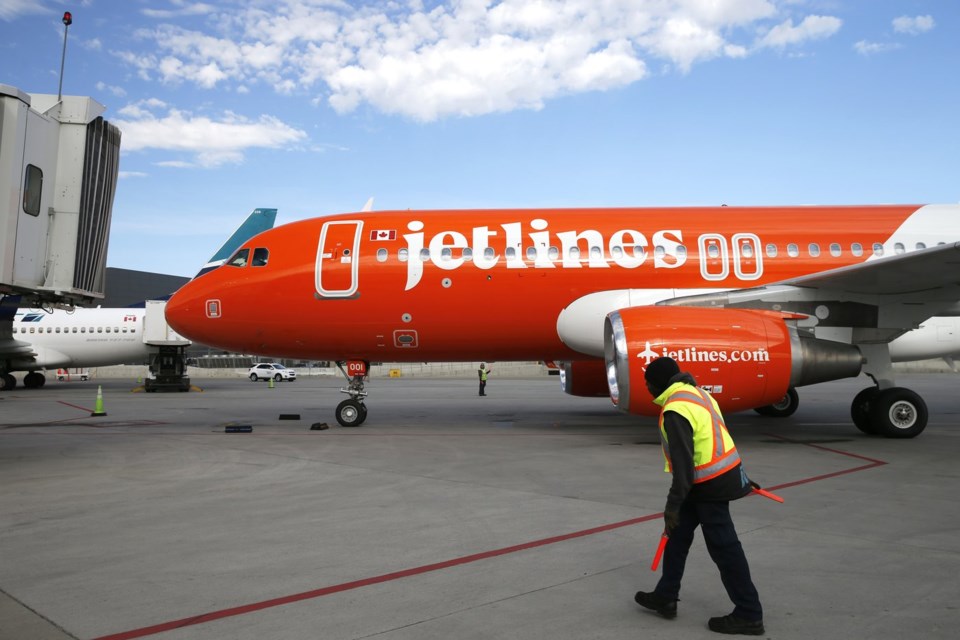Less than two years after it first hit the skies, Canada Jetlines has grounded its planes and ceased operations amid a cash crisis that caused it to become the third Canadian carrier in less than a year to stop flying.
The low-cost airline, which flew mainly to sun destinations out of Toronto on top of leases and charter trips, said Thursday it failed to find the capital needed to stay afloat and planned to file for creditor protection.
"The company ... pursued all available financing alternatives including strategic transactions and equity and debt financings," said spokeswoman Erica Dymond in a release.
"Unfortunately despite these efforts, the company has been unable to obtain the financing required to continue operations at this time."
Passengers with existing bookings should contact their credit card company to secure refunds, she said. "Every effort is being made to assist passengers at this time."
Trading of the company's shares on the NEO Exchange was halted late Wednesday afternoon.
The shutdown follows the resignation of four board members on Monday, including chairwoman and CEO Brigitte Goersch.
It signals yet another airline departure from Canadian skies after the closure of Lynx Air in February and budget carrier Swoop last October as concerns about domestic competition persist.
"Any time you lose some competition in the Canadian market it's kind of sad for the travellers, because it puts less pressure on prices," said Jacques Roy, a professor of transport management at HEC Montreal business school.
Founded in 2013 as a would-be charter airline, Canada Jetlines accounted for only a fraction of scheduled flights to sun destinations, he qualified.
The shutdown also underscores the challenges of running a carrier in a vast country with a diffuse population and only a few key air travel hubs.
"Every time a new player wants to enter the market, there's only one certainty: they're going to be losing money for the first eight, nine, 10 months at least, and perhaps even more. So you need a good bank account," said Roy, noting that leisure travellers are particularly price-sensitive.
"The major players will play the game of meeting your fares. And if you reduce your fares below your cost, then that's a recipe for failure in the short term," he said.
"It's a tough market."
Until Thursday, Jetlines was flying a few dozen flights per month from Toronto to Miami and Orlando, Fla., as well as Cancun, Mexico, according to aviation tracking firm Cirium.
It also flew charter flights, including for three Canadian Football League teams. The airline signed contracts with the Ottawa Redblacks, Hamilton Tiger-Cats and Toronto Argonauts that saw it haul players to select away games last season. The Redblacks contract was a three-year deal that may no longer be fulfilled.
Thursday's halt leaves only one budget carrier left in Canada — Flair Airlines — alongside the other major players: Air Canada, WestJet, Porter Airlines, Air Transat and the WestJet-owned Sunwing Airlines.
Last month, competition commissioner Matthew Boswell launched a market study of domestic airline service amid passengers' ongoing frustration with prices and quality.
Canada Jetlines, which has struggled to get more than a handful of planes off the ground since its inaugural flight in September 2022, faced a series of hiccups even before this week's turbulence.
On June 30, Eddy Doyle stepped down as CEO after taking on the role in 2021. In October 2022, former Quebec premier Jean Charest resigned from the board.
The challenges it faced in its home market were evident.
In January 2023, it pressed pause on domestic routes as the carrier refocused on sun destinations and leasing its planes, but said at the time it aimed to resume in-country flights that fall.
Last April, it signed over a pair of Airbus narrow-body jets to a European carrier for most of the remaining year in a so-called wet lease — where the lessor furnishes the aircraft, crew, maintenance and insurance for another company. It also deployed two more planes for flights between Morocco and Western Europe in a three-month agreement with Air Arabia.
In October 2019, the Mississauga, Ont.-based company announced it was postponing its planned December launch and laying off most employees after failing to secure the required financing and losing investment partners. The delay wound up dragging on for nearly three years, thanks in part to the COVID-19 pandemic.
That 2019 setback followed six years of fundraising and despite Ottawa lifting the foreign ownership ceiling on Canadian airlines to 49 per cent from 25 per cent in 2018, allowing for a wider pool of investors.
Canada Jetlines lost $14.2 million over the 12 months between March 2023 and last March, though it eked out a profit in one of the quarters, according to financial filings. Quarterly revenues ranged between $8 million and $12 million.
In May, the company secured a $2-million loan from Square Financial Investment Corp., a Mississauga-based holding company owned by board member Reg Christian, who was named executive vice-president as a result.
Jetlines had a $38.3-million deficit and negative working capital of $14.9 million as of March 31.
As recently as May 10, the company said in financial statements it planned to grow to seven planes by year's end and 15 aircraft by 2026.
This report by The Canadian Press was first published Aug. 15, 2024.
Christopher Reynolds, The Canadian Press




